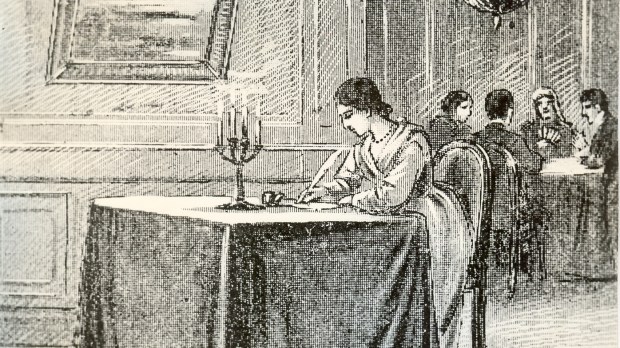The letters that went back and forth from Pauline, in France, to Phileas, in his various missionary endeavors in Asia, included the stories of the missionaries’ sacrifices and successes, and the mention of their needs.
The faith of the missionaries and those finding a home in the Church through their ministrations, was in stark contrast to the drab secularism the young Frenchwoman and her coworkers and friends faced around them.
The faith of these men and women in Asia was alive and intense, and yet it needed the support of Pauline and her friends from Lyon – their prayers, of course, and, at least, their pennies.
And thus began the Society for the Propagation of the Faith, now known as the Pontifical Mission Societies. It was 1822 and it wasn’t long before this young laywoman’s vision became a channel for the pope’s own support of the Church’s mission work, and the Societies becoming “pontifical.” Early help from their efforts also reached the young and growing Church in the United States!
Today, the Pontifical Mission Societies has a digital presence through MISSIO.
MISSIO, reflects Monica Yehle, who has been the communications director for the Mission Societies for 33 years, “was baked into Pauline’s vision.”
Today, MISSIO provides us all the chance to read, as it were, Phileas Jaricot’s letters. But even more than that, it gives us a chance to “see yourself in the picture,” as Yehle puts it.
“Pauline was a crowdfunder, before anyone ever used that phrase,” Yehle reflects. “MISSIO that you see today is based on Pauline’s vision. … She was this young teenage girl in France and now … it plays out in this ‘meeting’ experience, this ‘encounter’ experience.”
We might know that our baptism has made us all missionaries. “But what does that mean?,” Yehle asks. MISSIO helps to give the answer.
First is our connection to the mission with prayer, because “prayer is a transcendent thing. You’re connected to the missionaries,” Yehle said. “You meet them in prayer, as one missionary Sister once said when I interviewed her.”
But it’s also “a place of encounter,” as Yehle explains:
MISSIO is not just a place you go to give money. Yes, that’s important. But you meet these people. You know these people. These sisters, priests, and lay leaders. … Sister Claudine in Madagascar answers you. Brother Paul in Kenya provides an update on his work, and so many others.
Blessed Pauline’s vision developed through MISSIO expands her ability as a young French laywoman of the early 19th century. Now, her “coworkers” today are enabled to reach more people and develop relationships across borders of distance and language.
Such connection is more relevant than ever in our day, as we face together a worldwide pandemic.
“During the pandemic we’ve been able to see how [the missions are] coping. To realize [the virus is] a global issue. We were seeing it. And to see them coping with it with fewer resources,” Yehle noted.
Browse the work of the mission Church at MISSIO here.

In the footsteps of Fulton Sheen …
Monica Yehle is the editor of MISSION Magazine, which profiles mission work each quarter. (Request to receive the magazine here).
The Magazine was started in 1951 by Archbishop Fulton Sheen.
“He was one to use whatever places of encounter he could have during his life – it was radio even more than it was television,” Yehle said, noting the comparison with MISSIO developing on the internet. “God made that recipe a long time ago, and it unfolds.”
“The mission of the Church is alive,” Yehle assured, noting her gratitude for the blessing of the work in her own life for more than three decades. “Every day it’s ever new, this mission.”
“And you can find projects from all over the world, see faces and places, and literally meet the mission Church, and meet the great work that is being done, see it play out right there,” Yehle said.
… with Pope Francis
One of the newest projects of the Pontifical Mission Societies is a free, daily email that arrives at 8:30 am, whatever time zone you are in.
The email offers a short reflection from the words of Pope Francis, and a Psalm to turn to God in prayer each day, as Blessed Pauline encouraged.
Yehle explained how there has been a significant increase in subscribers to the daily Journey with the Pope message during the pandemic. “People were hungry for accompaniment,” Yehle said.
The Holy Father’s words, she added, lead people “to a space where they can cope, or reflect, or at least strengthen, sustain … His words crack open Scripture … There’s all different things in his messages.”
Journey with the Pope has “filled a space.”
“You journey together [with him],” Yehle said. It’s an “idea of encountering a moment with him. … A pause to reflect. In that way we keep alive the focus on reflection on prayer.”

